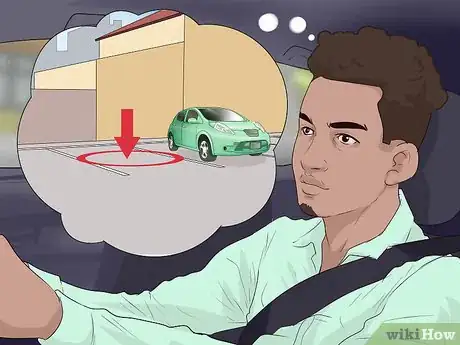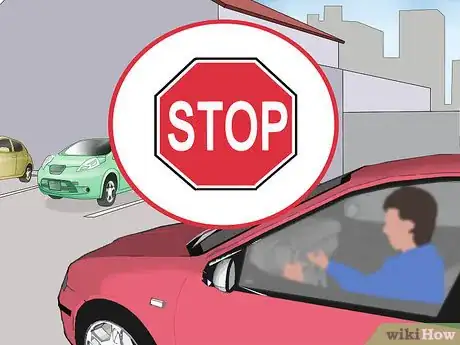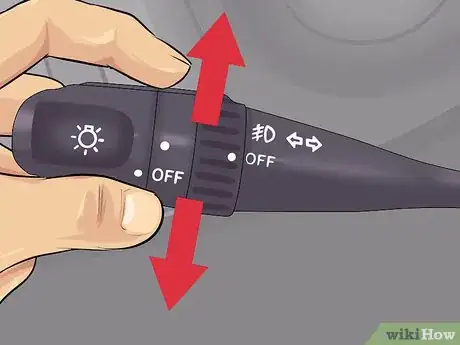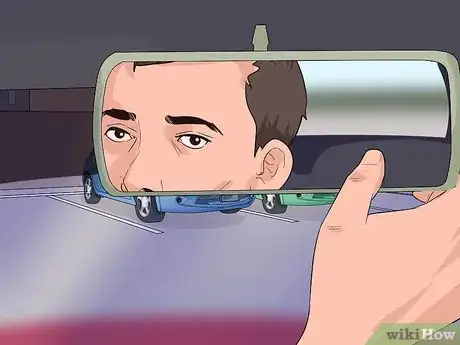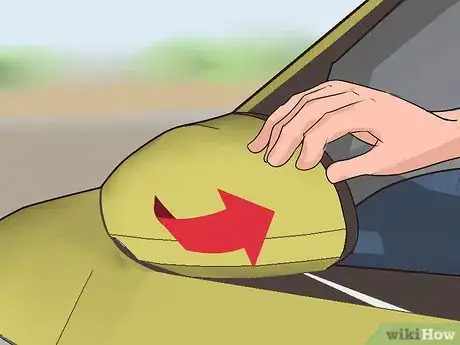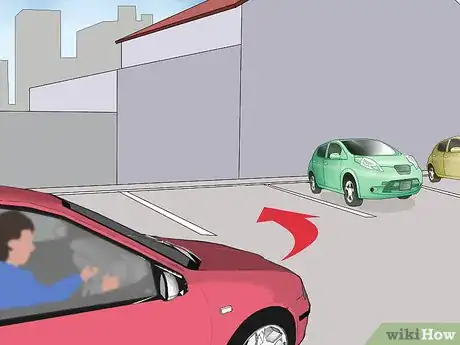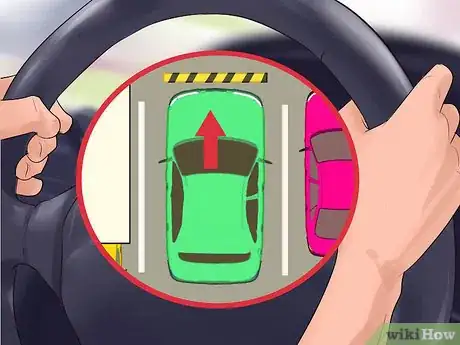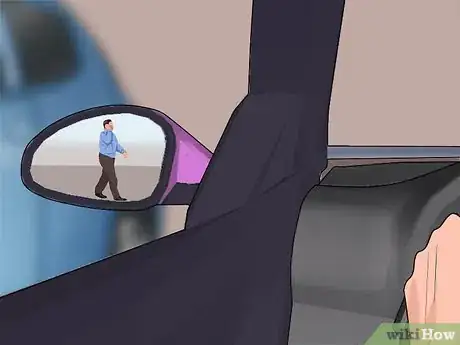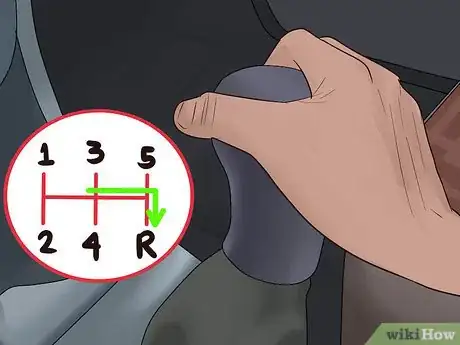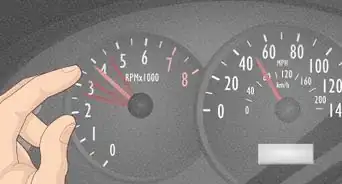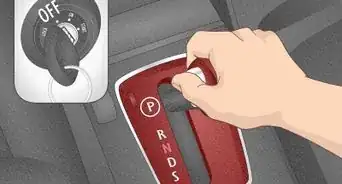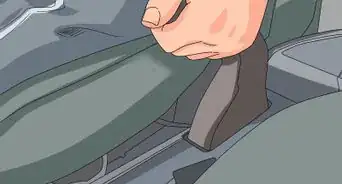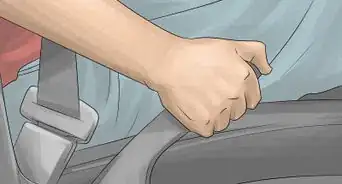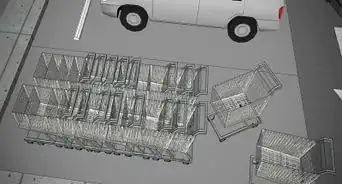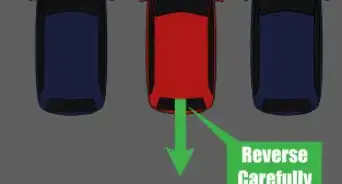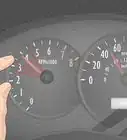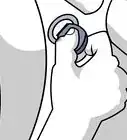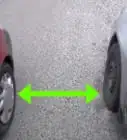This article was co-authored by Ibrahim Onerli. Ibrahim Onerli is a Driving Instructor and the Manager of Revolution Driving School in New York City. His mission is to make the world a better place by teaching safe driving. Ibrahim trains and manages a team of over eight driving instructors. He specializes in teaching defensive driving and stick shift driving.
This article has been viewed 151,479 times.
Parking seems like a simple task, but it’s not always easy. Some parking spaces are small and narrow, making it difficult to pull in safely without accidentally dinging the cars on either side of your space. Parking can be especially challenging when you drive a large vehicle. By taking your time and following a few helpful tips, you can successfully park safely in small spaces.
Steps
Pulling into a Parking Space
-
1Locate an available parking space. For an easier time parking, look for a parking space with another empty one next to it so that you don’t have to worry about getting too close to another parked car. If that isn’t possible, select the first empty parking space you find.
- If you are driving an SUV, a large truck, or an oversized vehicle, you should not attempt to park in a small space. Smaller parking spaces are best limited to smaller vehicles, such as compact cars.
- Attempting to park a large vehicle in a small space runs the risk of bumping into or scraping against another parked vehicle because there is no wiggle room, so to speak.
-
2Stop your vehicle before the space you plan to park in. The bumper of your vehicle should be lined up with the middle of the parking space immediately before the one you will be parking in.[1]Advertisement
-
3Flip on your turn signal. This lets other drivers know that you are about to park. When they know you are planning to park, they can stop and give you space to safely park your vehicle.
-
4Check your mirrors. Even though you are not reversing, it is a good idea to check your mirrors before pulling into the parking space. You want to be sure that any vehicles behind you have stopped.[2]
- If you observe a vehicle trying to pass you, wait until it is has passed before proceeding to park.
-
5Fold your side mirrors in, if possible. Once you have checked your mirrors as described in the previous step, if you have folding mirrors it is a good idea to fold in both the driver and passenger side mirrors before pulling into the parking space.
- In small parking spaces, vehicles parked next to one another run the risk of having the driver and/or passenger mirrors bump one another.
- Folding your driver and passenger side mirrors in will protect them from being broken off by other vehicles whose driver’s might not park as carefully as you.
-
6
-
7Continue turning the wheel as you drive forward into the parking space. Take your time and pull in slowly. Always be extra cautious when parking in small, narrow spaces.[5]
- If there is a vehicle parked in the space next to the driver side of your car and that vehicle is extremely close to the line between parking spaces, park your car closer to the opposite side of your parking space. This will leave more room on the driver’s side so that you can safely open your door without hitting the other vehicle when getting out of your car.
- If the vehicles parked on either side of you are positioned in the center of their spaces, then you can also park your car in the middle of your spot rather than leaving extra space on the driver’s side.
-
8Straighten up your steering wheel once you are parallel to the vehicles or spaces next to yours. When you are fully in the parking space you want to be sure your steering wheel is straightened back into its original position. This will make it easier to back out of the space later when you leave.[6]
-
9Continue to pull forward slowly until your vehicle is all the way in the parking space, then brake. If there is a vehicle parked directly in front of your space (it will probably be facing your vehicle, unless it was backed in), be careful not to bump it as you pull all the way in.
-
10Put your car in park and turn off the ignition. Upon exiting the vehicle, take caution when opening your door. In small parking spaces, there is not always enough room to open your car door all the way without hitting the vehicle next to yours.
Backing Out of a Parking Space
-
1Check your rearview mirror and look behind your vehicle before backing out of the parking space. You want to be sure there are no pedestrians walking past and that no other vehicles are in the way.[7] [8]
- If you folded your side mirrors in when parking, open them before reversing if you have enough room to do so.
- If you were able to open the side mirrors or if they were already open, check both to be sure the coast is clear before reversing.
-
2Put your vehicle in reverse and slowly begin backing up when it is safe. You will still need to continuously watch for pedestrians and other vehicles the entire time you are reversing out of the parking space.[9]
-
3Turn the steering wheel in the direction you want the rear of your vehicle to go as you reverse. Remember to continue watching out for people and other vehicles as you back up.[10]
-
4Apply the brakes and straighten up the steering wheel once your vehicle is all the way out of the parking spot. Do not release the brakes until the next step. You do not want your vehicle to accidentally roll further backward once you are completely clear of the parking space.
- If you were side mirrors were folded and you were not able to open them prior to backing out, go ahead and open them now before continuing.
-
5Put your vehicle in drive, release the brake, and slowly drive forward. You have now successfully pulled into and backed out of a small parking space.
Expert Q&A
-
QuestionIs there a minimum size for a car parking space?
 Ibrahim OnerliIbrahim Onerli is a Driving Instructor and the Manager of Revolution Driving School in New York City. His mission is to make the world a better place by teaching safe driving. Ibrahim trains and manages a team of over eight driving instructors. He specializes in teaching defensive driving and stick shift driving.
Ibrahim OnerliIbrahim Onerli is a Driving Instructor and the Manager of Revolution Driving School in New York City. His mission is to make the world a better place by teaching safe driving. Ibrahim trains and manages a team of over eight driving instructors. He specializes in teaching defensive driving and stick shift driving.
Driving Instructor A spot has to physically have enough room to fit your car obviously, but you do need some extra space left over to adequately make adjustments without banging into the adjacent cars. It really just depends on what you're comfortable maneuvering around.
A spot has to physically have enough room to fit your car obviously, but you do need some extra space left over to adequately make adjustments without banging into the adjacent cars. It really just depends on what you're comfortable maneuvering around. -
QuestionIs parallel parking difficult?
 Ibrahim OnerliIbrahim Onerli is a Driving Instructor and the Manager of Revolution Driving School in New York City. His mission is to make the world a better place by teaching safe driving. Ibrahim trains and manages a team of over eight driving instructors. He specializes in teaching defensive driving and stick shift driving.
Ibrahim OnerliIbrahim Onerli is a Driving Instructor and the Manager of Revolution Driving School in New York City. His mission is to make the world a better place by teaching safe driving. Ibrahim trains and manages a team of over eight driving instructors. He specializes in teaching defensive driving and stick shift driving.
Driving Instructor Look, it can be super intimidating when you're just starting out, but it gets a lot easier once you get some practice. If you live in a city and you have to do this with any kind of regularity, it will eventually become second nature.
Look, it can be super intimidating when you're just starting out, but it gets a lot easier once you get some practice. If you live in a city and you have to do this with any kind of regularity, it will eventually become second nature. -
QuestionI always get the angle wrong when I'm turning the wheel. When do I start turning in the other direction when I'm reversing?
 Ibrahim OnerliIbrahim Onerli is a Driving Instructor and the Manager of Revolution Driving School in New York City. His mission is to make the world a better place by teaching safe driving. Ibrahim trains and manages a team of over eight driving instructors. He specializes in teaching defensive driving and stick shift driving.
Ibrahim OnerliIbrahim Onerli is a Driving Instructor and the Manager of Revolution Driving School in New York City. His mission is to make the world a better place by teaching safe driving. Ibrahim trains and manages a team of over eight driving instructors. He specializes in teaching defensive driving and stick shift driving.
Driving Instructor Step one is pulling up so that the back of your trunk meets the middle of the car in front of you. If you don't do that, it can cause all kinds of whacky problems with the next move. Then, as you're reversing, you turn out to a roughly 45-degree angle. You can sort of picture a triangle between the curb, the side of your vehicle, and the trunk of the car in front of you.
Step one is pulling up so that the back of your trunk meets the middle of the car in front of you. If you don't do that, it can cause all kinds of whacky problems with the next move. Then, as you're reversing, you turn out to a roughly 45-degree angle. You can sort of picture a triangle between the curb, the side of your vehicle, and the trunk of the car in front of you.
References
- ↑ https://driving-tests.org/beginner-drivers/how-to-park-a-car-between-two-cars/
- ↑ Ibrahim Onerli. Driving Instructor. Expert Interview. 18 November 2019.
- ↑ https://driving-tests.org/beginner-drivers/how-to-park-a-car-between-two-cars/
- ↑ Ibrahim Onerli. Driving Instructor. Expert Interview. 18 November 2019.
- ↑ Ibrahim Onerli. Driving Instructor. Expert Interview. 18 November 2019.
- ↑ Ibrahim Onerli. Driving Instructor. Expert Interview. 18 November 2019.
- ↑ https://seniordriving.aaa.com/improve-your-driving-skills/everyday-driving-challenges/backing-and-parking/
- ↑ Ibrahim Onerli. Driving Instructor. Expert Interview. 18 November 2019.
- ↑ https://seniordriving.aaa.com/improve-your-driving-skills/everyday-driving-challenges/backing-and-parking/
About This Article
If you need to park safely in a small space, take your time and follow a few simple tips to avoid dinging the cars around you. Before pulling into a tight spot, line your bumper up with the middle of the space immediately before the one you’re parking in. Turn your steering wheel toward the space you want to park in and slowly pull in. Once you’re parallel with the vehicles or spaces next to yours, straighten out your wheel as you continue to pull in. If you can, fold your side mirrors in before you start pulling into the space to avoid scuffing them against the neighboring cars. To learn how to back out of a small parking space, keep reading!
